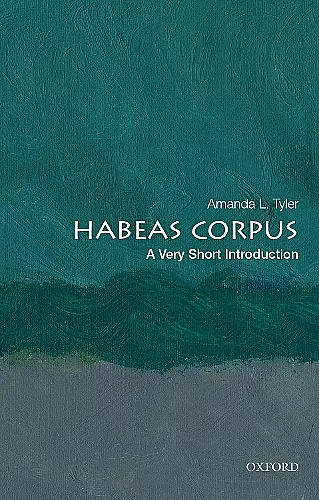Habeas Corpus
A Very Short Introduction
Format:Paperback
Publisher:Oxford University Press Inc
Published:27th May '21
Should be back in stock very soon

Legal scholar Amanda L. Tyler discusses the history and future of habeas corpus in America and around the world. The concept of habeas corpus--literally, to receive and hold the body--empowers courts to protect the right of prisoners to know the basis on which they are being held by the government and grant prisoners their freedom when they are held unlawfully. It is no wonder that habeas corpus has long been considered essential to freedom. For nearly eight hundred years, the writ of habeas corpus has limited the executive in the Anglo-American legal tradition from imprisoning citizens and subjects with impunity. Writing in the eighteenth century, the widely influential English jurist and commentator William Blackstone declared the writ a "bulwark" of personal liberty. Across the Atlantic, in the leadup to the American Revolution, the Continental Congress declared that the habeas privilege and the right to trial by jury were among the most important rights in a free society. This Very Short Introduction chronicles the storied writ of habeas corpus and how its common law and statutory origins spread from England throughout the British Empire and beyond, witnessing its use today around the world in nations as varied as Canada, Israel, India, and South Korea. Beginning with the English origins of the writ, the book traces its historical development both as a part of the common law and as a parliamentary creation born out of the English Habeas Corpus Act of 1679, a statute that so dramatically limited the executive's power to detain that Blackstone called it no less than a "second Magna Carta." The book then takes the story forward to explore how the writ has functioned in the centuries since, including its controversial suspension by President Abraham Lincoln during the Civil War. It also analyzes the major role habeas corpus has played in such issues as the World War II incarceration of Japanese Americans and the US Supreme Court's recognition during the War on Terror of the concept of a "citizen enemy combatant." Looking ahead the story told in these pages reveals the immense challenges that the habeas privilege faces today and suggests that in confronting them, we would do well to remember how the habeas privilege brought even the king of England to his knees before the law.
It is a real achievement to encapsulate and illustrate these various themes and principles so concisely, enabling even the reader without any prior legal knowledge to gain an insight into the nature of what has long been celebrated as this "great palladium of the liberties of the subject". * Trevor Allan, Society *
In this elegantly concise and concisely elegant volume, Amanda Tyler introduces readers to the privilege of the 'writ of habeas corpus'—one of the only individual liberties expressly enshrined in the original text of the US Constitution. In a tidy and terrific narrative, Tyler shows not just how an esoteric legal remedy came to be instrumental to the rule of law, but why it is incumbent upon all of us to fight to resurrect its historical role even as contemporary courts increasingly turn their backs. * Stephen I. Vladeck, Charles Alan Wright Chair in Federal Courts, University of Texas School of Law *
ISBN: 9780190918989
Dimensions: 137mm x 114mm x 5mm
Weight: 159g
184 pages